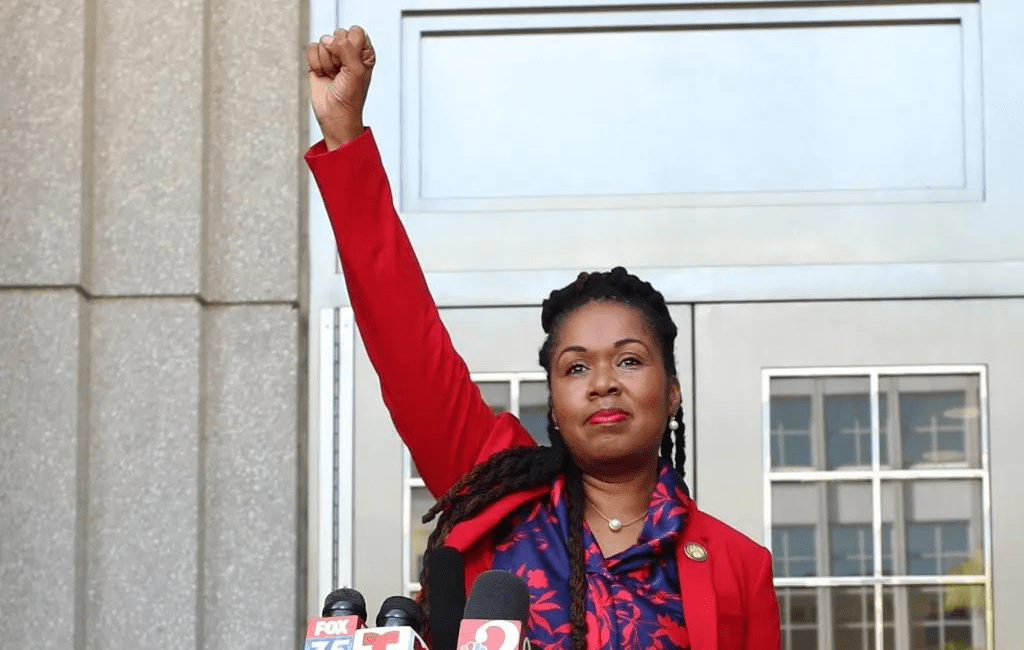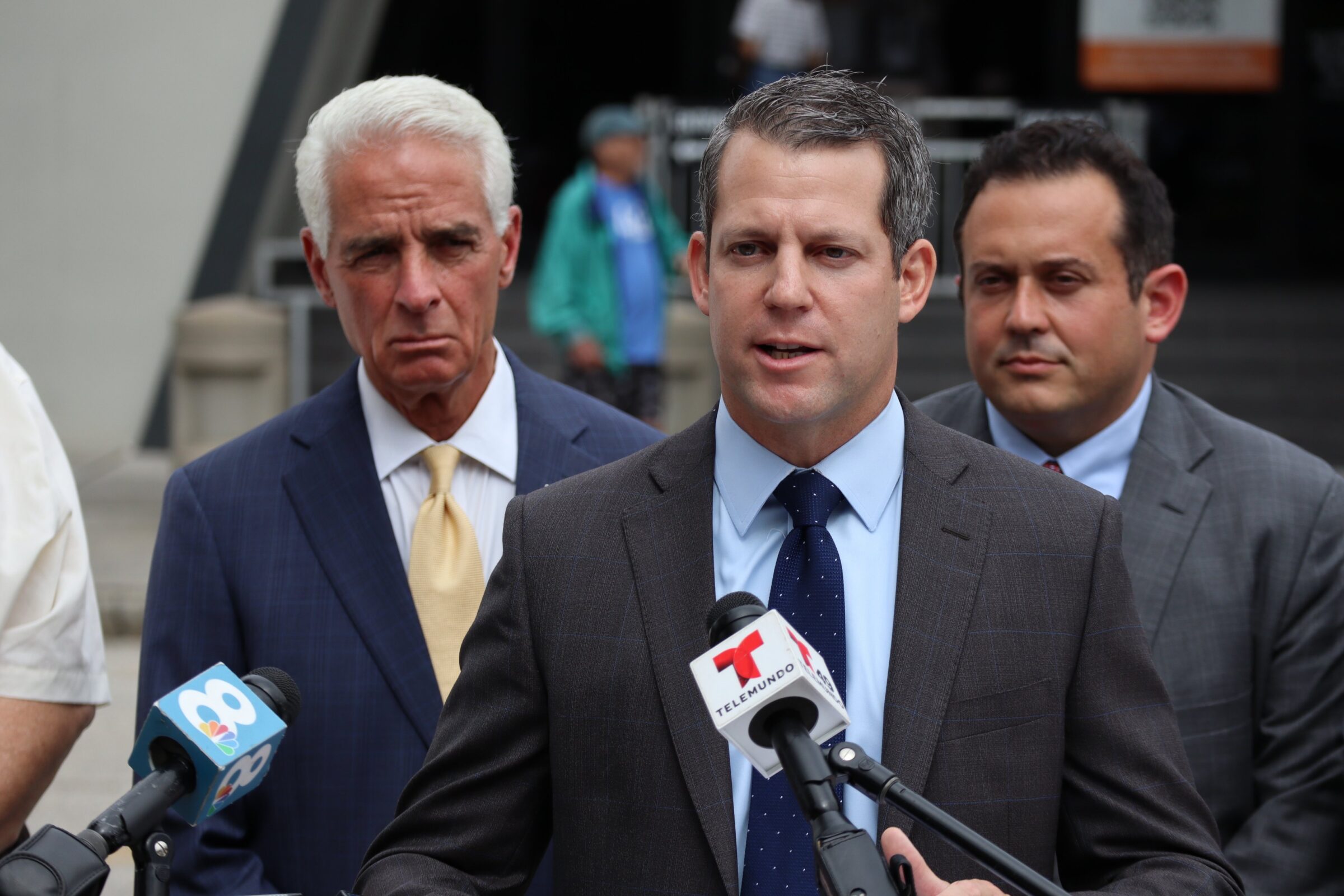Orlando Prosecutor Ousted by Governor Wins Her Job Back
Monique Worrell defeated the prosecutor Ron DeSantis appointed to replace her last year. In Tampa, however, another prosecutor removed by the governor lost his attempt at a comeback.
| November 5, 2024

One of the two Florida state attorneys ousted by Governor Ron DeSantis over her reform policies won her job back on Tuesday, while another lost to the tough-on-crime replacement the governor appointed in his place.
Monique Worrell, the Democratic state attorney in Orlando who was suspended by DeSantis last year, won 57 percent of the vote, defeating incumbent Andrew Bain, a member of the conservative Federalist Society whom the governor had appointed to replace Worrell after accusing her of neglecting her duties as a prosecutor.
“Tonight’s results underscore the resilience of our democracy and a powerful message from the people: No governor’s petty political maneuvers and no amount of dark money can silence the voices of thousands who demand a fair, smart approach to justice over the failed, outdated policies of the past,” Worrell said in a statement released by her campaign. “We’re bringing back a State Attorney who knows this role isn’t about racking up convictions but about pursuing justice without bending to a political agenda.”
In Hillsborough County, home to Tampa, Democrat Andrew Warren lost to incumbent Suzy Lopez, who was appointed by DeSantis in August 2022 after the governor removed Warren, arguing that he had also neglected his duties by vowing to not prosecute abortion cases and ending the aggressive prosecution of Black cyclists and pedestrians. Lopez won 53 percent of the vote.
In a statement, Warren defended his record and slammed the governor’s actions. “The best candidate doesn’t always win, especially when the other side cheats—illegally suspending you, then spending millions of dollars lying about you,” Warren said. “I hope Ms. Lopez grows into this role to become an effective and independent state attorney—not beholden to the governor or sheriff, but accountable to the people.”
Worrell and Warren had fought their suspensions in the courts, alleging that DeSantis overstepped his authority and removed them for political reasons. In August, the Florida Supreme Court, which is largely filled with DeSantis appointees, upheld the governor’s decision to remove Worrell by a vote of 6–1. Warren had found more success—two federal courts ruled that the governor’s conduct violated his First Amendment rights, but a decision by the federal appeals court hearing Warren’s case was stalled after DeSantis requested to argue his case in front of the full panel of judges.
In the lead-up to Election Day, Warren and Worrell faced questions about whether DeSantis would ultimately remove them from office again and replace them with his appointees. In an interview with Bolts this summer, Warren acknowledged that he and other Democrats were being watched by DeSantis on the campaign trail. “Every Democratic candidate in Florida has to campaign under the threat of DeSantis removing them solely because they’re a Democrat, solely for political reasons,” he said.
Ahead of the election, DeSantis would not commit to deferring to voters if they again elected Worrell and Warren, suggesting he might remove them again.
“When both of those folks were in office, they took the position that they didn’t have to enforce laws they disagreed with that caused people to be put back on the street who then victimized folks that should not have been victimized,” DeSantis told reporters at a September press conference when asked about what he’d do if they won.

Under state law, Florida’s governor has sweeping authority to suspend local elected officials for several reasons, such as neglect of duty, drunkenness, or malfeasance. Louis Virelli, a constitutional law professor at Stetson University, told Bolts there’s a high standard for neglect of duty, the reason for which DeSantis suspended Worrell and Warren, and it usually requires being able to show that someone won’t do their job, not just that they’ve established certain policies. Virelli, who would only speak about Warren’s case because he was not familiar with Worrell’s, said DeSantis’ removal of the prosecutor didn’t rise to that standard.
“Honoring the outcome of elections is what makes us a democracy,” Virelli told Bolts. “There’s nothing else to a democracy. Either we get to choose our representatives and our elected officials, or we don’t, and if we don’t, we’re not a democracy anymore.”
Beyond ousting local elected prosecutors, DeSantis was also accused of meddling in Orlando’s race for state attorney. Thomas Feiter, a Republican who lost in the August primary, said in a lawsuit last month that DeSantis’ team tried to bribe him to drop out of the race and help clear the way for Bain, who ran as an independent; the candidate who beat Feiter quickly dropped out of the race after winning the GOP primary. Feiter also wrote in a complaint to the Florida Bar Association that if Worrell won, DeSantis planned to remove her again and replace her with Bain. A local judge dismissed Feiter’s case last week on procedural grounds and the bar association did not follow up on the claim.
“If Monique wins, I think—well, they told me that the plan is to remove her again, and just put Bain back in,” Feiter said in September on local radio channel WMNF.
DeSantis did not respond to questions from Bolts about whether he plans to again remove prosecutors who were elected by voters.
Residents in Tampa and Orlando quickly felt the impact of DeSantis’ removal of their elected state attorney. In Tampa, the governor’s appointee, Lopez, swiftly rolled back Warren’s policies. Warren had instructed line prosecutors to stop pursuing nonviolent, misdemeanor cases resulting from bicycle and pedestrian stops after a 2015 Tampa Bay Times investigation showing such police stops overwhelmingly targeted Black people. Within four days of her appointment in 2022, Lopez sent out a memo lifting restrictions on how her office handled bicycle and pedestrian stop cases.
On Tuesday night, Yvette Lewis, president of the Hillsborough County NAACP, an organization that helped craft Warren’s policy, said she was disappointed with the results. “Not good for Black people,” she wrote in a text message.
In Orlando, Worrell had campaigned on a platform to reform the criminal justice system. Among her goals was to tackle mass incarceration and cut down on the number of kids tried in adult court. Worrell was also the director of the conviction integrity unit under former State Attorney Aramis Ayala and had approved DNA testing for two capital cases through her own unit shortly after taking office.
This story was updated on Nov. 6 to include a statement from Worrell.
Sign up and stay up-to-date
Support us
Bolts is a non-profit newsroom that relies on donations, and it takes resources to produce this work. If you appreciate our value, become a monthly donor or make a contribution.

